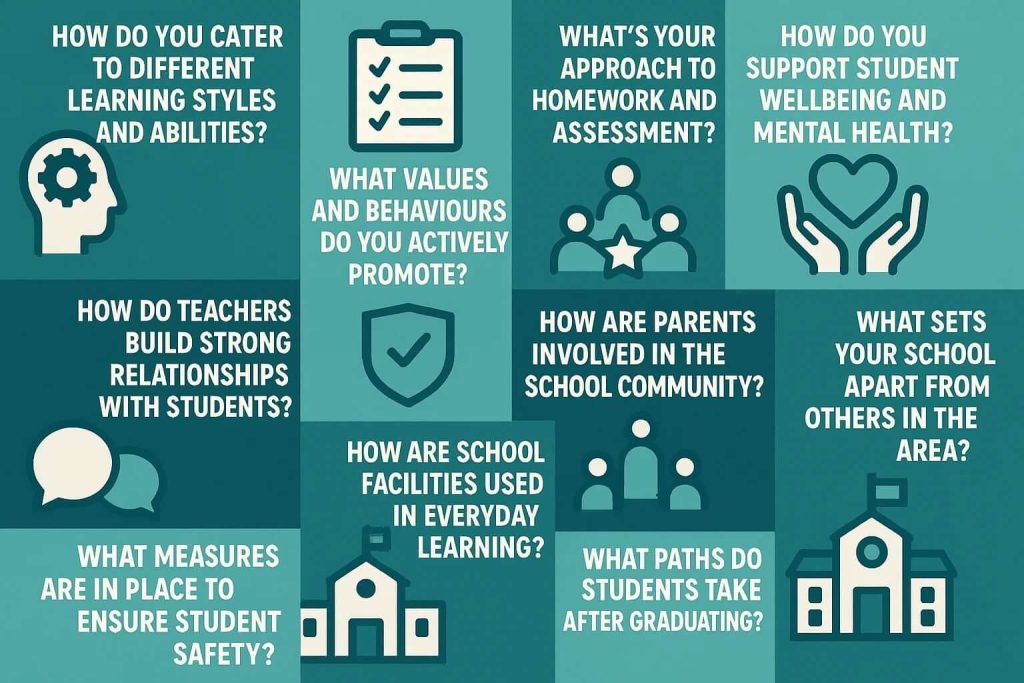Choosing the right school is one of the most important decisions a parent can make. A well-designed campus and polished presentation may look impressive, but it’s the everyday experience, how children learn, grow, and feel supported, that truly matters. A school tour is your chance to look beyond the surface and gather the insights that aren’t always obvious in a brochure.
Knowing what to ask can make all the difference. Our guidance here offers 10 thoughtful questions that help parents go deeper, uncovering the school’s values, approach to learning, and how well it aligns with your child’s academic and emotional needs. Whether you’re new to international education or simply want to feel more confident in your decision, these questions will help you make the most of your visit.
Questions About Teaching and Learning
Understanding how a school approaches learning will give you a clearer picture of what your child’s day-to-day experience might look like. Look beyond curriculum labels and ask how learning is made engaging, inclusive, and effective for every student.
1. How do you support different learning styles and academic levels in the classroom?
No two children learn the same way. Ask how teachers adapt their methods to support varied abilities, whether through differentiated instruction, learning support, or extension opportunities. A strong school should be able to share examples of how they meet each child where they are, whether they need more challenge, additional help, or simply a different approach.
2. What is your approach to homework and assessment?
This question reveals how the school balances academic rigour with wellbeing. Find out how much homework is expected at different ages, how feedback is given, and whether assessments are used to inform teaching. Schools with a forward-thinking philosophy often focus on formative assessment and meaningful feedback rather than just grades and test results.

Questions About Student Wellbeing and Pastoral Care
A nurturing school environment is just as important as academic excellence. These questions help you understand how the school supports your child’s emotional, social, and personal development, particularly during times of transition or challenge.
3. How do you support student wellbeing, both emotionally and socially?
Ask about dedicated wellbeing programmes, school counsellors, and how emotional literacy is woven into the curriculum. Look for initiatives like social-emotional learning (SEL), peer support groups, or mindfulness sessions. The best schools take a proactive, whole-child approach to wellbeing, recognising that mental health and academic success go hand in hand.
4. How do teachers and staff build relationships with students?
Children thrive when they feel known and valued. Ask how the school ensures that every child is seen in the classroom and across campus life. Schools with tutor systems, advisory programmes, or small class sizes are often better placed to build strong, trusting relationships between students and staff. These connections are vital for confidence, resilience, and engagement in learning.
Questions About School Culture and Community
A school’s culture shapes everything from how students treat one another to how families are welcomed. Asking about values and parent involvement can give you a clearer sense of whether the school community will feel like a good fit for your family.
5. What kind of values or behaviours are encouraged in your students?
Look beyond slogans and ask for concrete examples. How are values such as respect, integrity, or inclusion actively taught and reinforced? Are there leadership opportunities, service learning, or peer mentoring programmes that promote personal growth? A strong school culture should be visible in the way students interact.

6. How involved are parents in the school community?
A healthy school-parent partnership supports student success. Ask about opportunities for parental engagement, from volunteer roles and PTA events to regular communication and parent education sessions. Schools that encourage open dialogue and shared responsibility tend to foster stronger trust and collaboration with families.
Questions About Facilities and Safety
Impressive facilities can catch your eye, but what matters most is how those spaces are used and how the school ensures every child feels safe and supported throughout the day.
7. How do you ensure student safety on campus?
Ask about supervision during breaks, drop-off and pick-up procedures, and how visitors are managed on site. It’s also helpful to understand how the school prepares for emergencies, including lockdowns or natural disasters. A robust safeguarding policy and well-trained staff are non-negotiable in any high-quality school.
8. What facilities and resources do students use regularly?
Touring the campus is the perfect time to ask how spaces like libraries, science labs, performance halls, or sports areas are integrated into everyday learning. Ask how often students have access and whether facilities are updated to meet current educational needs. A school that uses its resources well will be able to show how those environments enhance learning, not just decorate the brochure.
Questions About Personal Fit and Future Readiness
The right school should not only support your child’s current needs but also help them grow into capable, confident young adults. These questions will help you evaluate how well the school prepares students for their next steps, academically, socially, and globally.
9. What do students go on to do after they leave this school?
Ask about alumni pathways, university destinations, and how the school supports future planning. Look for details about how students are guided in their choices, whether through counselling, career workshops, or mentorship. A strong school should be able to share real examples that reflect personalised outcomes.
10. What makes this school different from others in the area?
This question gives the admissions team space to share their proudest strengths. Listen carefully to see if their response reflects depth, consistency, and values. It can reveal whether the school’s philosophy is lived out in practice and whether it aligns with your own priorities as a parent.

Choosing with Confidence, Not Just Impressions
A school tour offers a valuable window into daily life, but it’s the questions you ask that reveal what truly matters. By going beyond appearances and focusing on values, support systems, and how your child might fit in, you gain clearer insight into whether the school is the right environment for their growth.
Take notes during your visit, reflect on how the school aligns with your child’s needs, and don’t hesitate to follow up with additional questions afterward. The best-fit school is the one where your child will feel known, challenged, and supported.
For more guidance on international schools, navigating transitions, and understanding curriculum models, explore expert-backed resources at AISL Mall.










